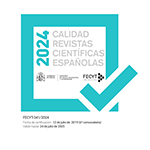Lexical errors in learners’ interlanguage. A contrastive study Italian/Spanish
Abstract
The objective of this study is the analysis of lexical errors in the written production of students who learn related languages, specifically Italian-speaking students who learn Spanish and Spanish-speaking students who learn Italian. The research is approached from a contrastive linguistic perspective. Its main references are, on the one hand, the Error Analysis approach and the Interlanguage hypothesis and, on the other, several classic and modern contrastive studies of both related and non-related languages. Next, we will offer a proposal to classify lexical errors, based on the adaptation of existing models, which helps us to establish its nature according to two interrelated criteria: first, if they are interlinguistic or intralinguistic errors and, secondly, if they are formal errors or meaning errors. To conclude, we will show the statistical computation of results, which states that, on the one hand, in both groups the percentage of interlinguistic errors is higher than intralinguistic errors and, on the other hand, the percentage of formal errors is greater than meaning errors. The interpretation of these data shows evidence of the existence of common patterns in the learning of both related languages.
Downloads
Article download
License
In order to support the global exchange of knowledge, the journal Cuadernos de Filología Italiana is allowing unrestricted access to its content as from its publication in this electronic edition, and as such it is an open-access journal. The originals published in this journal are the property of the Complutense University of Madrid and any reproduction thereof in full or in part must cite the source. All content is distributed under a Creative Commons Attribution 4.0 use and distribution licence (CC BY 4.0). This circumstance must be expressly stated in these terms where necessary. You can view the summary and the complete legal text of the licence.










